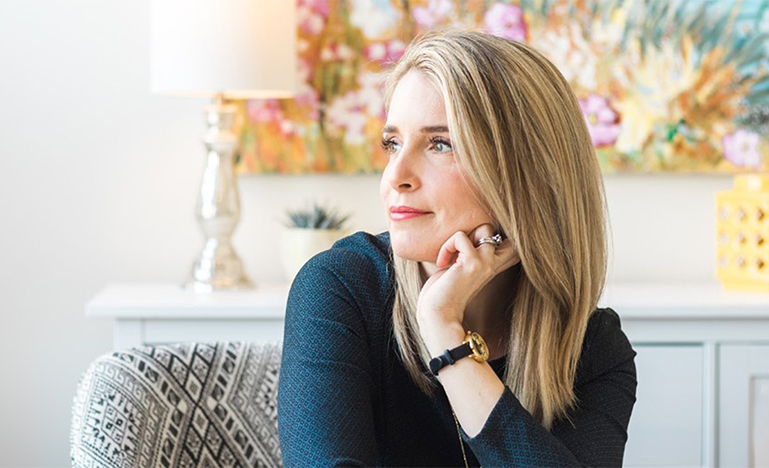Solo sisters
How collaboration is helping women thrive in their legal practices, and on their own.

In an elegant third-floor law office in Langford, B.C., lawyers Charlene Cleary and Sarah Klinger operate solo practices but share space, camaraderie and even informally collaborate from time to time.
More than 4,500 kilometers away in the Old Port of Montreal, established litigator Angela Markakis also flies solo, but rents out office space to other lawyers, often on an ad-hoc basis. She also relishes the network of women she has built since she left big law and ventured out on her own two years ago.
Cleary, Klinger and Markakis are emblematic of a collaborative culture that appears to be thriving among women lawyers who are charting their own course. They say they are living their best professional lives, in part because they have found wing mates to help navigate a business in which a lot of attention is focused on big firms rather than small independents.
"An alternative model to a firm is that people are building their own small practices but really in a feminine spirit, coming together and creating that camaraderie and sharing resources without the formal structure," says Cleary.
"I call us the solo sisters," adds Klinger. "It's a wonderful collective and we all support each other and cheer each other on."
While the exodus of women from larger law firms is well documented, there is not much follow-up study of those who open another door when they leave by choosing to stay in the profession on their own terms.
While most women start their careers at firms, statistics from the Law Society of Ontario in 2018 showed the sole practitioner was the number two job among women lawyers in the province, second to government. Solo and small firms dominate the legal landscape nationwide, according to a 2018 report from the Federation of Law Societies of Canada.
Klinger, who was called to the British Columbia bar in 2001, worked at various firms for 11 years before going out alone because "I would go home feeling like a lesser human being if I hadn't billed enough hours in a day."
She now rents office space from Cleary, a mother of two who set up her own shop after finding she needed more flexibility.
Cleary made the leap to solo practice in 2015, having mostly worked in traditional law firms since her call to the bar in 2009.
But the idea of doing something different had been percolating for years. Ever since her days in law school, she had anticipated a legal career in private practice with excitement. But having decided not to wait long before starting a family, she became pregnant in her articling year. "That's when everything changed for me," she says. "I knew I wasn't going to fit in the mould of the old boys club anymore, and I didn't really want that." It became clear to her "what the firm praised and what it rewarded," she says. "I could see then that the structure wasn't going to work for me."
As a solo practitioner, Cleary decided to focus on employment, business and administrative law, and in recent years, mediation. She found it daunting at first. After all, she was still technically a junior lawyer, albeit with several years of law firm experience under her belt. Before long, she realized she could generate work and make her way. "And I was really starting to think I can do this," says Cleary. "I can find my own clients, I can work when I want, I can say no to things I don't want to do."
The more success she found, the more empowered she felt. Five years later, the entrepreneur says she feels "very satisfied to have something I can call my own." Like other sole practitioners, she says she values the autonomy and flexibility, takes work that is aligned with her values, and she likes that her worth is not based on face time put in at the office. She also varies her fee structure to suit the file and often reaches out to other women who share her solo experience.
"It's a two-way street, where I know women that I can call to ask for their opinion on something and likewise, I am happy to take their calls," she says. "We don't charge each other for it and I always feel like if I give something over, I am going to get it back."
She cites examples such as sharing her assistant when she's got downtime, helping cover for other lawyers if something pops up when they are on holidays, or acting as a trustee of another woman's practice. This past year, she even shared an articling student with another lawyer who left a traditional partnership and uses Cleary's office space.
Markakis, like Klinger and Cleary, says she feels fortified by the informal support and collaboration she has encountered among women who practise solo.
"Because we understand what is at stake and the challenges as women, as mothers or whatever, you'll find women connecting at a certain level," says Markakis, who started a solo firm two years ago to "embrace my own freedom" after two decades working in downtown Montreal law firms, as an associate and later as a partner. The mother of two boys stresses that she does not regret those years, which she says helped get her where she is today because she learned a lot and made deep inroads in the profession.
She describes a recent phone call she received from a former colleague who now works on her own, asking Markakis if she would team up with her on an injunction because it was more in keeping with her practice area as a litigator.
"I said, 'OK, I'll do this. My student's available, I'm available, so let's organize our resources," said Markakis, who hopes to pursue more teamwork in the future.
She says she also offers up her boardroom occasionally and leases space to a lawyer who is based outside the city, but does not want to work alone when business brings her to Montreal.
Meaghan Daniel, a Montreal practitioner that started her solo practice in 2018, sees collaboration as a potential pathway to more complex files.
"I am trying to be careful about taking on a file that I don't have the capacity to do without the big-firm structure," says Daniel, who left her job as an associate at Falconers LLP so she could have more flexibility to care for her little boy, travel less, and pursue other interests. "You define the things that you feel capable of doing and balancing that with your caregiving or other responsibilities."
Like many sole practitioners, Daniel carved out a niche before venturing out on her own. The self-described "activist lawyer" built a practice focusing on Indigenous law, which she now does almost exclusively.
While new at working solo, Daniel says she knows about 20 to 25 women who are sole practitioners, ranging from young lawyers that are two or three years out of school to those who have been practising for 25 years. She said they are thinking of setting up a LISTSERV community, "so we can blast everyone instead of sending email."
In the meantime, she is contemplating a possible collaboration with another lawyer if she is retained in an upcoming inquest in Ottawa.
"The travel will be very difficult, so I am wondering if there is someone I can split that file with," says Daniel, who views the idea of one lawyer managing a case from start to finish as an "older idea" for practising law.
Klinger, who focuses on personal injury, employment law and estate law, notes that she deliberately chose to focus on specific areas.
"For a sole practitioner these days, I think that's key," she says, so as not to stretch too far into areas that are beyond one's comfort zone and "that can really increase your liability."
"It's probably less and less generalist these days because the law is evolving so quickly."
That's where solo sister Cleary comes in. "We're just there for each other in terms of questions and able to pop into each other's offices or text each other and say, 'Hey, what do you think of this?' We both do employment law, so there's a fair bit of back and forth. Or I do estate litigation and she does probate so I'll ask her questions if there is a piece I think I'm missing."
Currently, she also has a more formal arrangement, albeit as a one-off, working with another solo where Klinger is doing the litigation, and the other woman is the probate lawyer.
Another key area in which women help women is in drumming up business. A common remark in interviews that most of their business comes to them by word of mouth, community contacts and each other.
While informal collaboration appears to permeate solo practices among women, there are also some formal initiatives – both fledgling and established, to bring women together. One new initiative is Her Legal Network, a website that Toronto lawyer Thijiba Sinnathamby started earlier this year when she opened her practice, in part to fit with her lifestyle as the mother of a toddler.
"I had connections, but not the same sort of connections as you would have if you were practising for a few years," says Sinnathamby, who articled at a firm after finishing law school in 2015 but then took on "legal adjacent jobs."
She started her website because she learned, in conversations with other women lawyers, that most of their business comes from referrals. At the same time, she was getting inquiries from prospective clients about work involving law that were outside her practice area.
"I reached out to a bunch of lawyers that I knew and didn't know … and surprisingly, it took off overnight in terms of interest. I think it's a great way to network and get to know lawyers who are working in a different practice area that is complementary to yours." Also, people tend to go to big firms to hire lawyers, but "a huge chunk" of lawyers work in solo and small firms, so the website is a way to bring visibility to them.
There are also several established programs, groups, and networks, such as the Women's Legal Mentorship Program, which works in partnership with the University of Ottawa to link students to industry mentors before beginning their careers to help stem the flow of women leaving the profession. On its website, the WLMP notes that of the women who leave private practice, 27 per cent quit their law careers entirely.
Cleary, however, prefers to rely on connections that “naturally arise” through her practice – more so in any case than formal networking events.
However, she says she would have liked to be had more exposure to different kinds of mentorship opportunities – other than programs geared toward juniors. She would have liked to have heard from women who were finding non-traditional ways of practising law to inspire her at a time when she was having questions about her future in the profession.
"I wish when I was starting out that I would have had more of these things being profiled so I could see there is an answer out there," she says. "There are so many different ways to do this. So, if you feel you do not fit where you're at, it's not that there is anything wrong with you -- it's just not the right place for you."
Her office mate Klinger concurs: "I'm always excited to see that they're going out on their own because I know that certainly for me life got a lot better when I did that."
With additional reporting from Yves Faguy.


